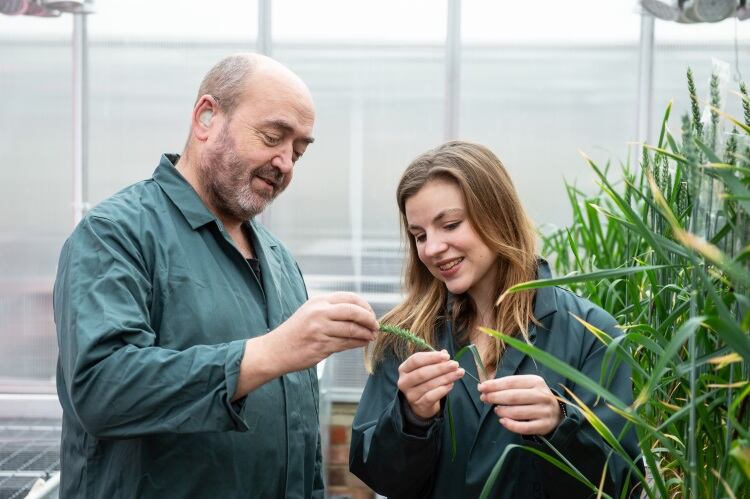The UK researchers are hoping to take their trials to the next level. The team has applied to the UK’s Department for Environment, Food and Rural Affairs (Defra) to run a field trial of the genome-edited wheat – the first such trial to be carried out in Europe – slated to begin in the autumn.
Acrylamide was first discovered in food in 2002 and is described as ‘extremely hazardous’.
According to project leader Prof Nigel Halford and Sarah Raffan, lead researcher of the field trial, in their book Acrylamide in Food – published by World Scientific in 2019 – its presence is one of the most difficult issues facing not only the food industry but all stakeholders in the food supply chain.

Acrylamide is classed as a processing contaminant, which requires close monitoring under EU law.
It is not present in raw food but forms from natural precursors during high-temperature processing (> 120°C). The chemical forms from a reaction between asparagine and some sugars that are naturally present in wheat grain, as well as other plant grains, tubers, beans and storage roots.
Fried, baked, roasted and toasted products – like toast, biscuits and snacks like potato chips, as well as coffee – are the major contributors to dietary exposure.
The compounds that impart colour, flavour and aroma form by similar chemical pathways, so the more toasted a piece of bread, for example, and the darker the end result, the more of the carcinogenic compound it is likely to contain. Unfortunately, the browning effect, known as the Maillard reaction, is what appeals to consumers.
“The colours associated with fried, baked, roasted and toasted foods form by similar chemical pathways to acrylamide, so colour is a very good indicator of how much acrylamide is forming,” said Prof Halford.
The compound has been found to cause cancer in rodents and in 2006, a World Health Organization report described it as ‘probably carcinogenic to humans’; a similar conclusion arrived at by the EU’s Contam Committee in 2015. This has resulted in the European Commission regulating it as potentially increasing the risk of developing cancer for consumers in all age groups and health chiefs have ramped up the pressure to mitigate it in all foods.
90% reduction
It is these concerns that prompted the Rothamstead researchers – along with colleagues from the University of Bristol – to attempt to produce low asparagine wheat using genome editing.
The scientists were able to halt the function of the gene involved in the production of asparagine in wheat, called TaASN2, using the CRISPR/Cas9 enome editing technique, which makes small changes to DNA, such as swopping around the sequence or even deleting or inserting short sections of DNA.
Asparagine concentrations in the grain were substantially reduced in the genome edited plants compared to un-edited plants, with one line showing a more than 90% reduction.
“We’ve used genome editing to reduce the amount of the amino acid, asparagine, in the grain,” said Raffan, who has just completed a PhD project to make and analyse the low asparagine wheat.
“It’s the asparagine that is converted to acrylamide during baking and toasting, so a low asparagine wheat should lead to lower levels of acrylamide, which is good news for anyone who likes their toast well done.”
Pushing for new UK legislation
Although the CRISPR/Cas9 technology is fast gaining approval worldwide, genome edited plants are currently treated as ‘genetically modified’ under EU regulations. However, the team is hoping the current Defra consultation may lead to new legislation in the UK, allowing genome edited food products to be more readily available to consumers.
It is reported that several Ministers, including Prime Minister Boris Johnson, believe there is a strong case to deregulate gene-editing technology to allow scientists, farmers and breeders access to healthier crops because, unlike genetic modification (GM), it does not manipulate DNA across different species.
Prof Halford does, however, emphasise that the wheat is still experimental, but if successful, it could change the landscape for bakery and snack producers.
“Acrylamide has been a very serious problem for food manufactures since being discovered in food in 2002,” he said.
“A number of methods for reducing acrylamide in food products by changing processing methods have been developed. Some have been successful, but they are not applicable to all food types, are often expensive to implement and may have detrimental effects on product quality.
“The food industry would therefore benefit from the availability of raw materials with lower acrylamide-forming potential, and the determining factor for acrylamide formation in products made from wheat and rye grains, and probably those of other cereals, is the concentration of soluble (non-protein) asparagine.
“It is essential that we test the wheat in field trials to see how it performs. If it comes through the field trial well it could be made available to wheat breeders. Even so, it would be another 5-10 years before very low asparagine wheat could appear on the market, and that would only be if the regulatory framework were conducive.”
The Defra consultation on the regulation of genetic techniques is due to close on 17 March.
Study:
Authors: Sarah Raffan, Caroline Sparks, Alison Huttly, et al.
First published: 26 February 2021





